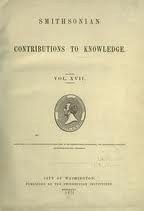
Systems of Consanguinity and Affinity of the Human Family is an 1871 book written by Lewis Henry Morgan (1818 - 1881) and published by the Smithsonian Institution. It is considered foundational for the discipline of anthropology and particularly for the study of human kinship. It was the culmination of decades of research into the variety of kinship terminologies in the world conducted partly through fieldwork and partly through a global survey of kinship terminologies in the languages and cultures of the world.[1]
It "created at a stroke what without exaggeration might be called the seminal concern of contemporary anthropology, the study of kinship..."[2][3] In the book Morgan argues that all human societies share a basic set of principles for social organization along kinship lines, based on the principles of consanguinity (kinship by blood) and affinity (kinship by marriage). At the same time, he presented a sophisticated schema of social evolution based upon the relationship terms, the categories of kinship, used by peoples around the world. Through his analysis of kinship terms, Morgan discerned that the structure of the family and social institutions develop and change according to a specific sequence.
- ^ Trautmann 2008.
- ^ Thomas R. Trautmann, p. 62, Dravidian Kinship. Cambridge University Press. "It has been argued kinship was 'invented' by the US lawyer, Lewis Henry Morgan, with the publication of his 'Systems of Consanguinity and Affinity of the Human Family' in 1871."
- ^ "Kinship", pp. 543–546. Peter P. Schweitzer. Volume one. The Social Science Encyclopedia, Third Ed., edited by Adam Kuper and Jessica Kuper. London: Routledge.
